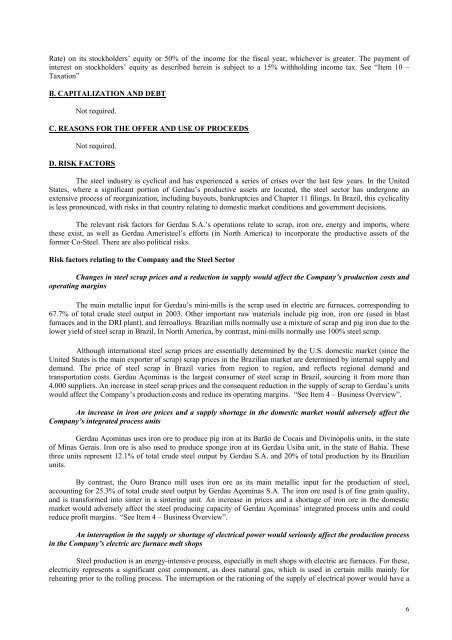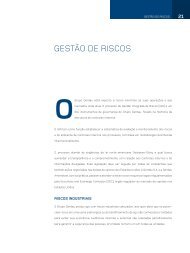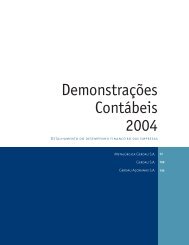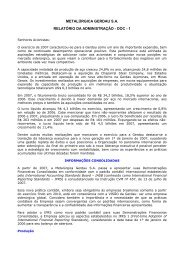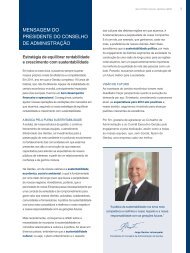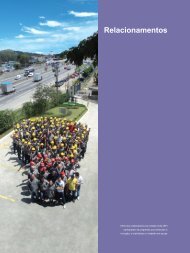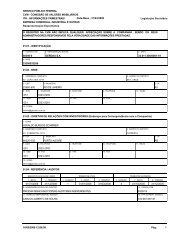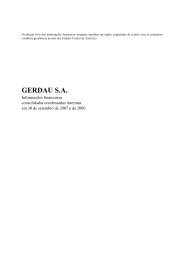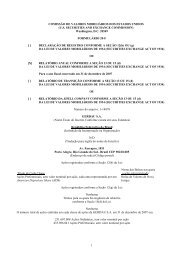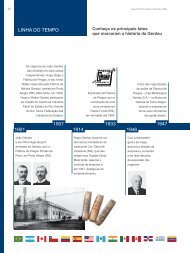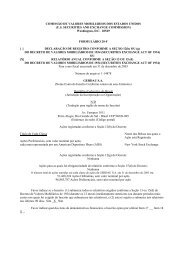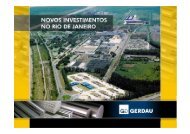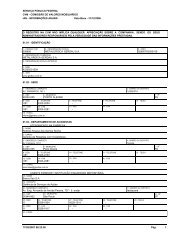Form 20-F - Gerdau
Form 20-F - Gerdau
Form 20-F - Gerdau
Create successful ePaper yourself
Turn your PDF publications into a flip-book with our unique Google optimized e-Paper software.
Rate) on its stockholders’ equity or 50% of the income for the fiscal year, whichever is greater. The payment of<br />
interest on stockholders’ equity as described herein is subject to a 15% withholding income tax. See “Item 10 –<br />
Taxation”<br />
B. CAPITALIZATION AND DEBT<br />
Not required.<br />
C. REASONS FOR THE OFFER AND USE OF PROCEEDS<br />
Not required.<br />
D. RISK FACTORS<br />
The steel industry is cyclical and has experienced a series of crises over the last few years. In the United<br />
States, where a significant portion of <strong>Gerdau</strong>’s productive assets are located, the steel sector has undergone an<br />
extensive process of reorganization, including buyouts, bankruptcies and Chapter 11 filings. In Brazil, this cyclicality<br />
is less pronounced, with risks in that country relating to domestic market conditions and government decisions.<br />
The relevant risk factors for <strong>Gerdau</strong> S.A.’s operations relate to scrap, iron ore, energy and imports, where<br />
these exist, as well as <strong>Gerdau</strong> Ameristeel’s efforts (in North America) to incorporate the productive assets of the<br />
former Co-Steel. There are also political risks.<br />
Risk factors relating to the Company and the Steel Sector<br />
Changes in steel scrap prices and a reduction in supply would affect the Company’s production costs and<br />
operating margins<br />
The main metallic input for <strong>Gerdau</strong>’s mini-mills is the scrap used in electric arc furnaces, corresponding to<br />
67.7% of total crude steel output in <strong>20</strong>03. Other important raw materials include pig iron, iron ore (used in blast<br />
furnaces and in the DRI plant), and ferroalloys. Brazilian mills normally use a mixture of scrap and pig iron due to the<br />
lower yield of steel scrap in Brazil. In North America, by contrast, mini-mills normally use 100% steel scrap.<br />
Although international steel scrap prices are essentially determined by the U.S. domestic market (since the<br />
United States is the main exporter of scrap) scrap prices in the Brazilian market are determined by internal supply and<br />
demand. The price of steel scrap in Brazil varies from region to region, and reflects regional demand and<br />
transportation costs. <strong>Gerdau</strong> Açominas is the largest consumer of steel scrap in Brazil, sourcing it from more than<br />
4,000 suppliers. An increase in steel scrap prices and the consequent reduction in the supply of scrap to <strong>Gerdau</strong>’s units<br />
would affect the Company’s production costs and reduce its operating margins. “See Item 4 – Business Overview”.<br />
An increase in iron ore prices and a supply shortage in the domestic market would adversely affect the<br />
Company’s integrated process units<br />
<strong>Gerdau</strong> Açominas uses iron ore to produce pig iron at its Barão de Cocais and Divinópolis units, in the state<br />
of Minas Gerais. Iron ore is also used to produce sponge iron at its <strong>Gerdau</strong> Usiba unit, in the state of Bahia. These<br />
three units represent 12.1% of total crude steel output by <strong>Gerdau</strong> S.A. and <strong>20</strong>% of total production by its Brazilian<br />
units.<br />
By contrast, the Ouro Branco mill uses iron ore as its main metallic input for the production of steel,<br />
accounting for 25.3% of total crude steel output by <strong>Gerdau</strong> Açominas S.A. The iron ore used is of fine grain quality,<br />
and is transformed into sinter in a sintering unit. An increase in prices and a shortage of iron ore in the domestic<br />
market would adversely affect the steel producing capacity of <strong>Gerdau</strong> Açominas’ integrated process units and could<br />
reduce profit margins. “See Item 4 – Business Overview”.<br />
An interruption in the supply or shortage of electrical power would seriously affect the production process<br />
in the Company’s electric arc furnace melt shops<br />
Steel production is an energy-intensive process, especially in melt shops with electric arc furnaces. For these,<br />
electricity represents a significant cost component, as does natural gas, which is used in certain mills mainly for<br />
reheating prior to the rolling process. The interruption or the rationing of the supply of electrical power would have a<br />
6


